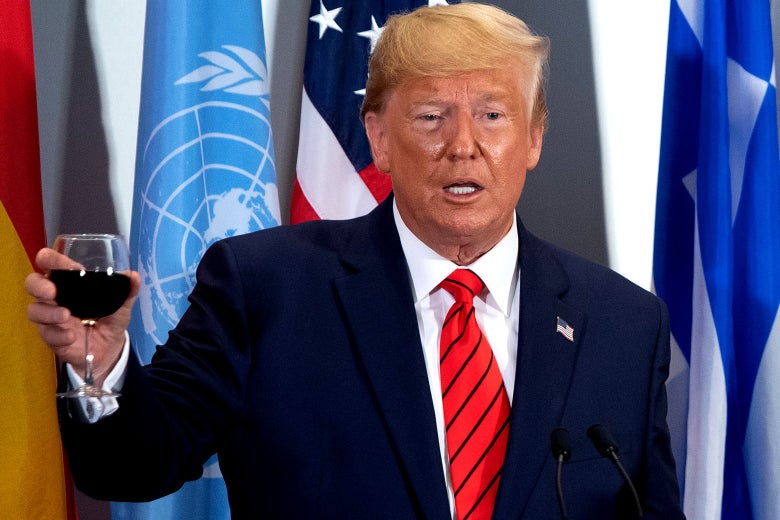
Donald Trump raises a glass at the United Nations General Assembly on Tuesday.
Saul Loeb/AFP/Getty Images
President Donald Trump delivered an utterly spiritless speech to the U.N. General Assembly on Tuesday, a speech aimed entirely at a domestic audience, touting nationalism and thick borders as the solutions to all problems, lacking even the pretense of fealty to the principles or worth of international organizations such as the one he was addressing.
“The future does not belong to globalists. The future belongs to patriots,” he said early on. “Liberty is only preserved, sovereignty is only secured, democracy is only sustained, greatness is only realized by the devotion of patriots,” he said toward the end, adding, “When our nations are greater, our futures will be brighter.” The path to peace and freedom “begins at home.”
He said nothing about the role that alliances, coalitions, or the United Nations itself might play in laying or protecting that path. He mentioned America’s traditional allies only once, to complain—as he has on many occasions—that they aren’t paying “their fare share of the tremendous defense burden.”
In return, the speech drew no applause from the gathering of world leaders, except for a tepid round at its conclusion. Trump didn’t seem to mind.
The speech drew no applause from the gathering of world leaders, except for a tepid round at its conclusion. Trump didn’t seem to mind.
His last speech at the U.N., in 2018, outlined similar themes. For instance, he said, “America is governed by Americans. We reject the idea of globalism, and we embrace the doctrine of patriotism.” However, back then he took care to add, “We are grateful for all the work the United Nations does around the world to help people build better lives,” and he assured the assembly that the U.S. was “committed to making the United Nations more effective and accountable.”
There were no such sentiments in this address—no mention of the United Nations at all.
Instead, he boasted of America’s rising incomes and declining unemployment. He pledged, “America will never be a socialist country.” He derided defenders of migrants’ rights as “open-border activists who cloak themselves in the rhetoric of social justice” for the sake of “cruel and evil” policies. He made no distinction between illegal immigrants and refugees who are legally seeking to escape repression. He said nothing about climate change—remarkable for a session that is treating the issue as a major theme—or any other problems that seep across national borders.
The irony and tragedy of Trump’s approach is that some of his own concerns can be solved only through global action. At one point in the speech, he urged the world’s leaders to join his campaign against the Iranian regime, imploring them not to seek ways to circumvent his harsh sanctions. “All nations have a duty to act,” he said. “No responsible government should subsidize Iran’s bloodlust.” Yet Trump makes it harder for these leaders to join him on this campaign when he so cavalierly dismisses the idea of cooperation in general—and when he encourages other nations to pursue their own cultures, traditions, and interests as they see fit. It also doesn’t help that he withdrew from the Iran nuclear deal—a multilateral agreement that was codified in a U.N. Security Council resolution.
There is a contradiction in this theme of “patriotism above globalism” that Trump doesn’t seem to recognize. At various points in the speech, he urged the other leaders to practice democracy, to empower women, even to legalize homosexuality. But these freedoms are rooted in ideals—such as universal human rights, enshrined in international law—that Trump otherwise rejects as dangerous “globalism.” One can imagine a few dictators in the audience smirking at the nerve of this American president who touts nationalism and sovereign rights as the excuses for doing whatever he wants, while insisting that they reform their societies in the way he demands. It is also notable that Trump named only Iran and, to some extent, China as the objects of his wrath—but not Saudi Arabia, Russia, or North Korea, whose human rights records are worse.
American presidents and diplomats have long struggled with the tension between interests and ideals in the crafting of foreign policy, which sometimes requires compromise on one goal or the other. But Trump has no recognition of the tension, or the hypocrisy.
The United Nations has its problems. The world, increasingly fragmented, needs leadership; the U.N. has served as one forum in which a powerful nation or group of nations can extend that leadership. It was clear from both the substance and the blasé tone of his speech on Tuesday that Trump has no interest in taking part.
Readers like you make our work possible. Help us continue to provide the reporting, commentary and criticism you won’t find anywhere else.
Join Slate Plusfrom Slate Magazine https://ift.tt/2lty9x1
via IFTTT
沒有留言:
張貼留言